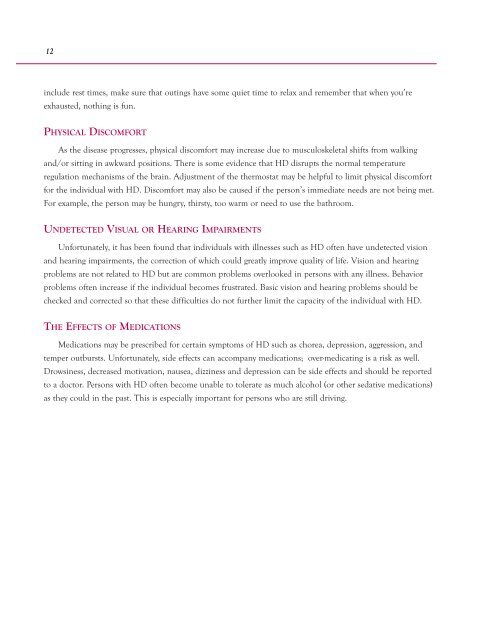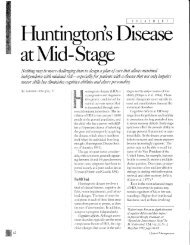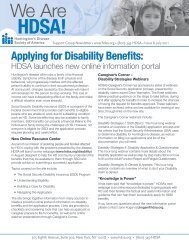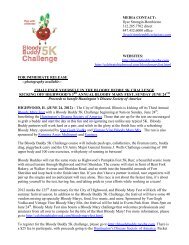Understanding Behavior in HD.final.8-18-05 - Huntington's Disease ...
Understanding Behavior in HD.final.8-18-05 - Huntington's Disease ...
Understanding Behavior in HD.final.8-18-05 - Huntington's Disease ...
You also want an ePaper? Increase the reach of your titles
YUMPU automatically turns print PDFs into web optimized ePapers that Google loves.
12<br />
<strong>in</strong>clude rest times, make sure that out<strong>in</strong>gs have some quiet time to relax and remember that when you’re<br />
exhausted, noth<strong>in</strong>g is fun.<br />
PHYSICAL DISCOMFORT<br />
As the disease progresses, physical discomfort may <strong>in</strong>crease due to musculoskeletal shifts from walk<strong>in</strong>g<br />
and/or sitt<strong>in</strong>g <strong>in</strong> awkward positions. There is some evidence that <strong>HD</strong> disrupts the normal temperature<br />
regulation mechanisms of the bra<strong>in</strong>. Adjustment of the thermostat may be helpful to limit physical discomfort<br />
for the <strong>in</strong>dividual with <strong>HD</strong>. Discomfort may also be caused if the person’s immediate needs are not be<strong>in</strong>g met.<br />
For example, the person may be hungry, thirsty, too warm or need to use the bathroom.<br />
UNDETECTED VISUAL OR HEARING IMPAIRMENTS<br />
Unfortunately, it has been found that <strong>in</strong>dividuals with illnesses such as <strong>HD</strong> often have undetected vision<br />
and hear<strong>in</strong>g impairments, the correction of which could greatly improve quality of life. Vision and hear<strong>in</strong>g<br />
problems are not related to <strong>HD</strong> but are common problems overlooked <strong>in</strong> persons with any illness. <strong>Behavior</strong><br />
problems often <strong>in</strong>crease if the <strong>in</strong>dividual becomes frustrated. Basic vision and hear<strong>in</strong>g problems should be<br />
checked and corrected so that these difficulties do not further limit the capacity of the <strong>in</strong>dividual with <strong>HD</strong>.<br />
THE EFFECTS OF MEDICATIONS<br />
Medications may be prescribed for certa<strong>in</strong> symptoms of <strong>HD</strong> such as chorea, depression, aggression, and<br />
temper outbursts. Unfortunately, side effects can accompany medications; over-medicat<strong>in</strong>g is a risk as well.<br />
Drows<strong>in</strong>ess, decreased motivation, nausea, dizz<strong>in</strong>ess and depression can be side effects and should be reported<br />
to a doctor. Persons with <strong>HD</strong> often become unable to tolerate as much alcohol (or other sedative medications)<br />
as they could <strong>in</strong> the past. This is especially important for persons who are still driv<strong>in</strong>g.

















